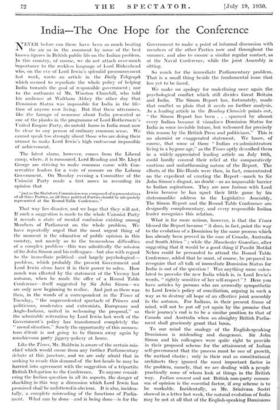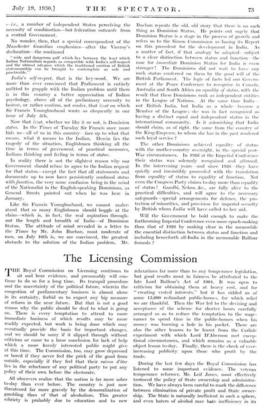India—The One Hope for the Conference
NEVER before can there have been so much beating the air as in the comment by some of the best known figures in British public life on the Indian problem. In this country, of course, we do not attach over-much importance to the reckless language of Lord Birkenhead who, on the eve of Lord Irwin's splendid pronouncement last week, wrote an article in the Daily Telegraph which seemed to repudiate the whole policy of helping India towards the goal of responsible government ; nor to the outbursts of Mr. Winston Churchill, who told his audience at Waltham Abbey the other day that Dominion Status was impossible for India in the life- time of anyone now living. But that these utterances, like the farrago of nonsense about India presented as one of the planks in the programme of Lord Rothermere's United Empire Party, do untold harm in India must now be clear to any person of ordinary common sense. We cannot speak too strongly about those who are doing their utmost to make Lord Irwin's high endeavour impossible of achievement.
The latest alarm, however, comes front the Liberal camp, where, it is rumoured, Lord Reading and Mr. Lloyd George are striving to make common cause with Con- servative leaders for a vote of censure on the Labour Government. On Monday evening a Committee of the Unionist Party made a first move in recording its opinion that
"just as the Statutory Commission was composed of representatives of all three Parties, so all three political Parties should be adequately represented at the Round-Table Conference."
That way lies disaster, and we hope that they will not. If such a suggestion is made to the whole Unionist Party it reveals a state of mental confusion existing among Members of Parliament on the whole problem. We have repeatedly urged that the most urgent thing of the moment is the education of public opinion in this country, not merely as to the tremendous difficulties of a complex problem—this was admittedly the mission of Sir John Simon and his colleagues—but also with regard to the immediate political—and largely psychological— problem, which probably the present Government and Lord Irwin alone have it in their power to solve. How much was effected by the statement of the Viceroy last autumn, when he made the offer of a Round Table Conference—itself suggested by Sir John Simon—we are only now beginning to realize. And just as there was then, in the words of a correspondent in the Times of Tuesday, " the unprecedented spectacle of Princes and politicians, moderates and extremists, Europeans and Anglo-Indians, united in welcoming the proposal," so the admirable reiteration by Lord Irwin last week of the Government's policy has transformed completely the " moral situation." Surely the opportunity of this momen- tous detente is not going to be thrown away again by mischievous party jiggery-pokery at home.
Like the Times, Mr. Baldwin is aware of the certain mis- chief which would ensue from any further Parliamentary debate at this juncture, and we are only afraid that in seeking to evade this demand of the hot-heads he may be harried into agreement with the suggestion of a tripartite British Delegation to the Conference. To anyone consid- ering the Indian question in all its aspects, the danger of shackling in this way a discussion which Lord Irwin has promised shall be unfettered is obvious. It is also, inciden- tally, a complete misreading of the functions of Parlia- ment. What can bg done--and is being done--is for the Government to make a point of informal discussion with members of the other Parties now and throughout the summer, and also to ensure a similar regular contact, as at the Naval Conference, while the joint Assembly is sitting.
So much for the immediate Parliamentary problem. That is a small thing beside the fundamental issue that has yet to be faced.
We make no apology for underlining once again the psychological conflict which still divides Great Britain and India. The Simon Report has, fortunately, made that conflict so plain that it needs no further analysis. As a leading article in the Bombay Chronicle points out, " the Simon Report has been . . spurned by almost every Indian because it visualizes Dominion Status for India in some invisible future, but welcomed for precisely this reason by the British Press and politicians." This is no alarmist or exaggerated statement. We know, of course, that some of those " Indian ex-administrators living in a bygone age," as the Times aptly described them in a widely appreciated leading article on July 10th, could hardly conceal their relief at the comparatively cautious and unforthcoming nature of the Report. The efforts of the Die-Harris were then, in fact, concentrated on the expedient of erecting the Report—much to Sir John Simon's disgust, no doubt—as an impassable barrier to Indian aspirations. They are now furious with Lord Irwin because he has upset their little game by his statesmanlike address to the Legislative Assembly. The Simon Report and the Round Table Conference are designedly complementary, and every responsible Indian leader recognizes this relation.
What is far more serious, however, is that the Times blessed the Report because " it does, in fact, point the way to the evolution of a Dominion by the same process which has already been proved in the case of Canada, Australia and South Africa " ; while the Manchester Guardian, after suggesting that it would be a good thing if Pandit Motilal Nehru could be persuaded to attend the Round Table Conference, added that he must, of course, be prepared to recognize that all talk of immediate Dominion Status for India is out of the question ! Was anything more calcu- lated to provoke the new India which is, in Lord Irwin's words, " rightly sensitive of her self-respect" ? Here you have articles by persons who are avowedly sympathetic to Lord Irwin's policy of conciliation, arguing in such a way as to destroy all hope of an effective joint assembly in the autumn. For Indians, in their present frame of mind, will not be put off yet again by the promise that their journey's end is to be a similar position to that of Canada and Australia when an almighty British Parlia- ment shall graciously grant that boon.
To our mind the analogy of the English-speaking Dominions is misleading and dangerouS. Sir John Simon and his colleagues were quite right to provide in their proposed scheme for the attainment of Indian self-government that the process must be one of growth, the method elastic ; only in their zeal as constitutional architects they ignored the most important factor in the problem, namely, that we are dealing with a people practically none of whom look at things in the British way. Indian consent and not British non-party consen- sus of opinion is the essential factor, if any scheme is to be workable. Incidentally, as Mr. Srinivasa Sastri showed in a letter last week, the natural evolution of India may be not at all that of the English-speaking Dominions —i.e., a number of independent States perceiving the necessity of combination—but federation outwards from a central Government.
No wonder, then, that a special correspondent of the Manchester Guardian emphasizes—after the Viceroy's declaration—the continued
"wide and dangerous gulf which lies between the least which Indian Nationalism regards as compatible with India's self-respect and the utmost advance which the traditional caution of British statesmanship can be brought to contemplate as safe and pract
India's self-respect, that is the key-word. We are more than ever convinced that Parliament is entirely unfitted to grapple with the Indian problem until there is in this country a better appreciation of Indian psychology, above all of the preliminary necessity to bestow, or rather confirm, not confer, that izzat on which Sir Francis Younghusband wrote so eloquently in our issue of July 5th.
Now that izzat, whether we like it or not, is Dominion status. In the Times of Tuesday Sir Francis once more bids us—all of us in this country—face up to what that means, what it means to the Indian. Herein lies the tragedy of the situation, Englishmen thinking all the time in terms of government, of practical measures, Indians thinking and feeling in terms of status.
In reality there is not the slightest reason why our Government should refuse to agree to the Indian request for that status—except the fact that all statements and documents up to now have persistently confused status with function, the very dame confusion being in the mind of the Nationalist in the English-speaking Dominions, as General Smuts pointed out when he was here in January.
Like Sir Francis Younghusband, we cannot under- stand that so many Englishmen should boggle at the claim—which is, in fact, the real aspiration through- out the length and breadth of India—of Dominion Status. The attitude of mind revealed in a letter to the Times by Mr. John Buchan, most moderate of men, on July 10th is, we are convinced, the greatest obstacle to the solution of the Indian problem. Mr. Buchan repeats the old, old story that there is no such thing as Dominion Status. He points out sagely that Dominion Status is a stage in the process of growth and refers us to the Simon Commission es basing its Report on this precedent for the development in India. As a matter of fact, if that analogy be adopted— subject to a clear distinction between status and function—the ease for immediate Dominion Status for India is even stronger ! The Dominions did not wait to have any such status conferred on them by the good will of the British Parliament. The logic of facts led our Govern- ment at the Peace Conference to recognize in Canada, Australia and South Africa an equality ty* status, with the result that these Dominions rank as independent en! ilies in the League of Nations. At the same time India -- not British India, but India as a whole—became a Member of the League; she was in fact recognized as having a distinct equal and independent status in the international community. Is it astonishing that India should claim, as of right, the same from the country of the King-Emperor, to whom she has in the past rendered such loyal service ?
The other Dominions achieved equality of status with the mother-country overnight, in the special post- War circumstances. In 1926 at the Imperial Conference their status was solemnly recognized and affirmed. In the intervening years—and since 1926 —they have quietly and irresistibly proceeded with the translation from equality of status to equality of function. Nut even the Congress Party claims to-day more than equality of status ! Gandhi, Nehru, &c., are fully alive to the practical difficulties, and will agree to the necessary safeguards—special arrangements for defence, the pro- tection of minorities, and provision for imperial security by British whom India will have called to her aid.
Will the Government be bold enough to make the forthcoming Imperial Conference even more epoch-making than that of 1926 by making clear in the meanwhile the essential distinction between status and function and including henceforth all-India in the memorable Balfour formula ?

















































 Previous page
Previous page